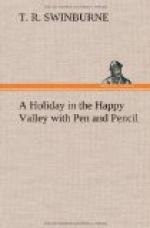Late in the evening we changed at Baroda, and dawn next morning saw us speeding across the swamps and inlets, which gave place ere long to the palm groves and clustering houses which marked the farther limits of the suburbs of Bombay.
We found the heat—damp and oppressive—very trying after the drier air of Rajputana, and the Taj Mahal Hotel below our expectations in all respects save price. It is undoubtedly better than most Indian hotels, but yet it is not good!
Bombay is chiefly connected in our minds with the inevitable fuss and worry of packing and departure.
As we left the Taj Mahal Hotel, in a conveyance piled high with miscellaneous baggage, we saw the last of our faithful and indispensable Sabz Ali, as he hurriedly quitted the hostelry in our wake, fearful lest undue delay should jeopardise the possession of the spoils he was carrying off, wrapped in bulging bundles of goodly size.
Jane and I were sorrier, I think, to part with him than he with us. After all, we were but troublesome charges, for whose well-being he had to answer to “General ’Oon Sahib,”—charges who had not been quite so lavish with their incalculable riches as they should have been, and who doled out rupees, and even annas, with a sorely grudging hand; still I think Sabz Ali, as he made his way to the station, with many rupees lining his inmost garments, and a flaming “chit” carefully stowed away, felt a certain regret at parting from the “sahibs,” who had really shown a very fine appreciation of his merit, and were sending him back with much honour to his own country.
Late in the afternoon, as the spires and roofs of the city stood dark against the sky, and the many steamers and native dhows showed black upon a flood of liquid gold, the Persia got under way, and we slowly left the anchorage, steaming out into the fading light.
We stood long, leaning over the bulwarks and watching the lights of Bombay, at first so distinct, melt gradually into a line of tiny stars as the gulf widened that separated us from the land where we had spent so many happy days.
I wonder if we shall ever revisit it? I trust so ... and yet——
“As a rule it is better to revisit only in imagination the places which have greatly charmed us ... for it was not merely the sights that one beheld which were the cause of joy and peace. However lovely the spot, however gracious the sky, these things external would not have availed but for contributory movements of mind and heart and blood—the essentials of the man as then he was."[6]
[1] These notes on the history of Chitor are taken,
it need hardly be said,
from Tod’s Rajast’han,
he being the authority on Rajputana. An
account of the above incident
is given somewhat differently by Maurice
in his Modern History of
Hindostan (1803), who also relates that
Akbar used the same trick
to enter Rhotas in Behar, after being long
baffled by the apparent impregnability
of that fortress.




